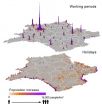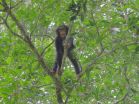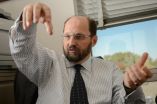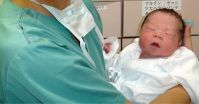(Press-News.org) A solution to one of the key challenges in the development of quantum technologies has been proposed by University of Sussex physicists.
In a paper published today (28 October) in Nature Communications, Professor Barry Garraway and colleagues show how to make a new type of flexibly designed microscopic trap for atoms.
Quantum technology devices, such as high-precision sensors and specialised superfast computers, often depend on harnessing the delicate interaction of atoms. But the methods for trapping these tiny particles are hugely problematic because of the atoms' tendency to interact with their immediate environment.
The Sussex team, in collaboration with the University of Strathclyde, have shown that a new technique involving electromagnetic induction could be the solution.
Professor Garraway says: "Our findings are significant because future quantum technologies will depend on confining and manipulating cold atoms. The design of those traps is normally extremely complex and involves stringent requirements for scale and smoothness. Our new approach is simple to implement using a chip-based technology, which is flexible and very robust.
"This is another step towards the development of new quantum technologies that will revolutionise many aspects of our lives. Already, our researchers in Atomic, Molecular and Optical Physics (AMO) are developing devices that could radically change how we measure time, navigate our world, sense our gravitational field and solve seemingly impossible mathematical problems."
INFORMATION:
Notes for editors
'Inductively guided circuits for ultracold dressed atoms', German A. Sinuco-Leo´n, Kathryn A. Burrows, Aidan S. Arnold & Barry M. Garraway, is published in Nature Communications
Press Office: Jacqui Bealing and James Hakner press@sussex.ac.uk Tel: +44 1273 678888
Physicists' simple solution for quantum technology challenge
2014-10-28
ELSE PRESS RELEASES FROM THIS DATE:
Technique uses bacteria's own CRISPR-Cas system to turn off gene
2014-10-28
Researchers from North Carolina State University have developed a technique that co-opts an immune system already present in bacteria and archaea to turn off specific genes or sets of genes – creating a powerful tool for future research on genetics and related fields.
"This should not only expedite scientific discovery, but help us better engineer microbial organisms to further biotechnology and medicine," says Dr. Chase Beisel, an assistant professor of chemical and biomolecular engineering at NC State and senior author of a paper on the work. "For example, this ...
Researchers prove accuracy of mobile phone population mapping
2014-10-28
A study by an international team, including the University of Southampton, has shown population maps based on anonymous mobile phone call record data can be as accurate as those based on censuses.
Their findings show maps made using mobile records are detailed, reliable and flexible enough to help inform infrastructure and emergency planners; particularly in low income countries, where recent population density information is often scarce.
Southampton geographer and senior author on the study, Dr Andy Tatem, says: "Proving the resilience and accuracy of using mobile ...
Self-reported sleep disturbances are linked to higher risk for Alzheimer's disease in men
2014-10-28
In a new study, researchers from Uppsala University demonstrate that elderly men with self-reported sleep disturbances run a higher risk of developing Alzheimer's disease than men without self-reported sleep disturbances. The results are published in the scientific journal Alzheimer's & Dementia.
The researchers followed more than 1,000 men, who were initially 50 year old, between the years 1970 and 2010. The results of the study show that self-reported sleep disturbances were linked to an increased risk for Alzheimer's disease during the 40-year follow-up period, particularly ...
The early chimp gets the fig
2014-10-28
This news release is available in German.
How do our close relatives, the chimpanzees, acquire sufficient food when times are lean? By studying wild chimpanzees in the Taï National Park in Côte d'Ivoire researchers of the Max Planck Institute for Evolutionary Anthropology in Leipzig, Germany, provide a clear example of how great apes can acquire extra energy needed to maintain large, costly brains. They show that chimpanzees make their sleeping nests more en route to breakfast sites containing fruits that are more competed for by other daytime fruit-eaters ...
Lessons learned from SARS pandemic should inform current contagion protocols
2014-10-28
In 2003, a novel coronavirus caused a pandemic that affected 26 countries. Severe Acute Respiratory Syndrome (SARS) was most prevalent in Asia; the number of cases in Singapore was second only to China.
In an article published in the American Journal of Roentgenology (AJR), a group of radiologists in Singapore outline the ways in which both medical facilities and practitioners there have incorporated lessons learned from the SARS pandemic.
"The pandemic served as a wake-up call for the medical services, which had to respond and reorganize quickly to meet the rapidly ...
Do financial experts make better investments?
2014-10-28
EAST LANSING, Mich. --- Financial experts do not make higher returns on their own investments than untrained investors, according to research by a Michigan State University business scholar.
The first-of-its-kind study analyzed the private portfolios of mutual fund managers and found the managers were surprisingly unsuccessful at outperforming nonprofessional investors. The findings suggest average investors might be better served to handle their own portfolios rather than pay the often-high fees charged by mutual fund managers, said Andrei Simonov, associate professor ...
Identifying the biological clock that governs female fertility
2014-10-28
Researchers at the University of Gothenburg have identified the biological clock that governs female fertility. The discovery represents a major contribution to research aimed at finding medical approaches to treating infertility in women.
Some women can have successful pregnancies at the age of 50, whereas other are unable to get pregnant when they are 30. Researchers are not yet able to fully explain such differences. One factor is that the onset of menopause is influenced by the point at which the uterus runs out of eggs to release.
A recent study at the University ...
New insights into the development of ciliopathies
2014-10-28
"Epithelial cell layers line all of the inner and outer body and organ surfaces in the human body, for example in the lung, intestine, pancreas and in the inner ear," said Moritz Gegg. Cilia – small, hair-like, microtubule-based structures – project from BBs and are precisely positioned on many of these epithelial cells. "Only through this exact positioning can cilia movements be coordinated so precisely that for example mucus can be transported from the lung or sound can be perceived from sensory inner ear hair cells," added Heiko Lickert.
Cilia are anchored ...
Many home blood pressure monitors may be inaccurate
2014-10-28
Philadelphia, PA (October 28, 2014) — Home blood pressure monitors may be inaccurate in up to 15% of patients, according to a study that will be presented at ASN Kidney Week 2014 November 11¬–16 at the Pennsylvania Convention Center in Philadelphia, PA.
Major guidelines recommend home blood pressure monitoring to guide diagnosis and treatment of patients with hypertension; however, little is known about the real-world accuracy of home blood pressure monitors that patients use. Researchers led by Swapnil Hiremath, MD, MPH (Ottawa Hospital and University ...
NUS researchers discover for the first time that a rare bush frog breeds in bamboo
2014-10-28
Researchers from the National University of Singapore (NUS) have discovered a new reproductive mode in frogs and toads - breeding and laying direct developing eggs in live bamboo with narrow openings - which was observed in the white spotted bush frog (Raorchestes chalazodes). This critically endangered frog is currently only one of two species known to adopt this novel reproductive strategy. The findings were published in The Linnean Society of London's Biological Journal of the Linnean Society, in October 2014.
Life history strategies to increase reproductive success ...




